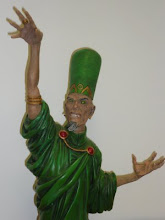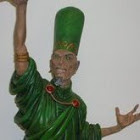 A gripping and deeply engaging period crime dram set in an alternative, (the cast are anthropomorphic), 1950's New Orleans. Private investigator John Blacksad is hired by music producer to find a missing jazz pianist. The simple case starts to become significantly more complicated right away as one of his most important leads is murdered and he finds that there is considerably more to the case than had been revealed. The action is wonderfully staged, the reveals are excellent and the grim unraveling of the plot is true to the black roots of noir crime.
A gripping and deeply engaging period crime dram set in an alternative, (the cast are anthropomorphic), 1950's New Orleans. Private investigator John Blacksad is hired by music producer to find a missing jazz pianist. The simple case starts to become significantly more complicated right away as one of his most important leads is murdered and he finds that there is considerably more to the case than had been revealed. The action is wonderfully staged, the reveals are excellent and the grim unraveling of the plot is true to the black roots of noir crime.This comic overcomes an inherent problem, making a story about humanized animals work as a serious, grim drama work on its own terms. The takes itself and the reader seriously enough that it is clear from the start that the book is not a joke and the cast have more than enough personality to allow them emerge as individuals regardless of how they look.
The biggest problem that the book has is Juanjo Guarnido's stunning art, it is so beautiful, so detailed and atmospheric that it could easily overwhelm the story and end up severely diluting the impact of the comic as a whole. Instead the art serves the purpose it should it clothes the words ans ideas of the story with graceful telling detail and gives the extra dimensions to the cast and context that elevate the whole. From the opening in a strip club to the low key and inevitable ending that art is never ahead of the story. This does not limit the impact of the art, it serves to focus it and give it force and depth, the city of New Orleans is brought to lush and shadowed life in a way that words would struggle to do with similar economy and scale.
The cast are everything that a group caught up in a classic noir scenario should be, John Blacksad is tough and ready to fight, competent but not invincible, his sidekick is nicely seedy, the musicians at the heart of the story are bruised from their lives and trying to be true to their music at the same time. The body language and expressions are clear and meaningful, they interact with each other and their context with natural ease.
Noir crime stories are very easy to get wrong, the trappings are so well known and visible that it is easy to miss the real muscle and blood that drives a true noir story. Noir stories are wounded romances, betrayal is expected but always there is hope that it will not happen. The tension comes from the sad surprise that the worst case has been revealed as the true state of affairs while never dropping into defeated cynicism. Juan Diaz Canales writes with exactly that spirit and it fits the time period, the mixed decade of post-war optimism and disillusion, the plot is sharp and effective, it gives an edge to the art. A superb comic.


No comments:
Post a Comment